教育的目的中英文版
石中英教育哲学第三章原文

石中英教育哲学第三章原文第三章:教育的目的与价值1. 引言在前两章中,我们探讨了教育的定义以及教育的基本原则。
本章将继续深入探讨教育的目的与价值。
教育不仅仅是一种手段,用来传授知识和技能,它还应该有更深远的意义和价值。
教育的目的是什么?教育的价值又是什么?这些问题将在本章中进行讨论。
2. 教育的目的教育的目的是指教育活动所致力于实现的目标。
教育的目的可以从多个角度来阐述,取决于不同的教育理论和观点。
以下是几种常见的教育目的:2.1 个人发展与成长教育应该致力于促进个体的全面发展和成长。
这包括培养学生的智力、情感、道德、审美和实践等各个方面的能力。
个人发展与成长的目的是为了让每个学生都能够实现自己的潜能,成为一个健康、自信和全面发展的个体。
2.2 社会服务与公民教育教育应该使学生认识到自己是社会的一员,并培养他们为社会做出贡献的意识和能力。
教育应该教导学生具备一定的社会责任感,并培养他们成为积极的公民,具备良好的道德素质和健康的社会行为习惯。
2.3 自我实现与生涯发展教育应该帮助学生发现自己的兴趣和才能,并为他们提供实现自我价值和个人目标的机会。
教育应该帮助学生建立职业规划,培养他们适应社会和职业环境的能力,并为他们的未来生涯发展提供必要的支持和指导。
3. 教育的价值教育的价值可以从多个层面来解释:3.1 个人层面的价值教育对于个体来说具有重要的个人层面的价值。
通过接受教育,个体可以获得知识和技能,并提升自己的能力和素质。
教育可以帮助个体实现自我潜能,提高生活质量,并为个体的职业发展和生涯规划提供支持。
3.2 社会层面的价值教育对于社会来说也具有重大的社会层面的价值。
教育可以提高社会的整体素质和文化水平,促进社会进步和发展。
通过教育,社会可以培养出更多的人才,并为社会的发展提供必要的人力资源。
教育还可以传递社会的价值观念和道德规范,促进社会的和谐和稳定。
3.3 人类层面的价值教育对于人类来说具有更为广泛的人类层面的价值。
西方名人教育观(中英双语·原创中文翻译)

西方名人教育观(中英双语·原创中文翻译)1. No man who worships education has got the best out of education.... Without a gentle contempt for education no man's education is complete. ---G.K. Chesterton对教育过于崇拜的人,并不能得到教育的真谛…一个人如果对教育不带一丝蔑视的话,他的教育是不完整的。
---G·K·切斯特顿2. The aim of education should be to teach us rather how to think, than what to think - rather to improve our minds, so as to enable us to think for ourselves, than to load the memory with thoughts of other men. ---Bill Beattie教育的目的应该是教我们思维的方法而不是思维的内容,教我们改善思维方法,使我们能独立思考,而不是在我们的记忆里载入他人的思想。
---比尔·贝蒂3. The whole purpose of education is to turn mirrors into windows. ~Sydney J. Harris教育的全部目的就是把镜子变成窗户。
---斯尼·J·哈里斯4. Education is what remains after one has forgotten what one has learned in school. ---Albert Einstein 如果我们将学校学过的东西忘得一干二净,剩下的东西就是教育的本质。
教育的目的的英文作文
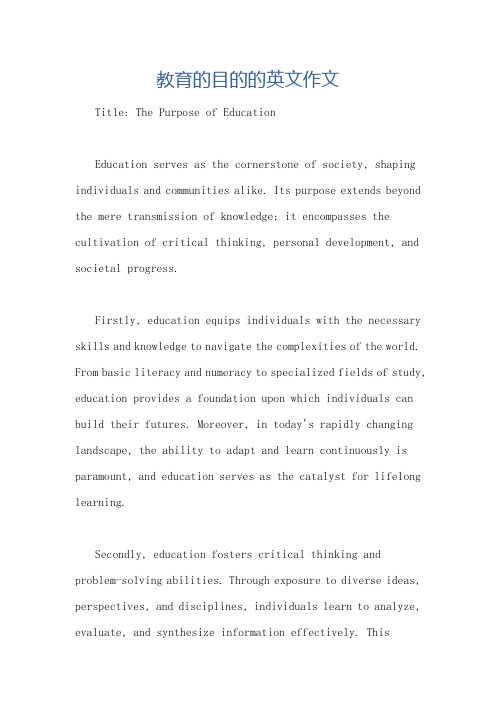
教育的目的的英文作文Title: The Purpose of EducationEducation serves as the cornerstone of society, shaping individuals and communities alike. Its purpose extends beyond the mere transmission of knowledge; it encompasses the cultivation of critical thinking, personal development, and societal progress.Firstly, education equips individuals with the necessary skills and knowledge to navigate the complexities of the world. From basic literacy and numeracy to specialized fields of study, education provides a foundation upon which individuals can build their futures. Moreover, in today's rapidly changing landscape, the ability to adapt and learn continuously is paramount, and education serves as the catalyst for lifelong learning.Secondly, education fosters critical thinking and problem-solving abilities. Through exposure to diverse ideas, perspectives, and disciplines, individuals learn to analyze, evaluate, and synthesize information effectively. Thiscapacity for critical thinking not only enhances personal decision-making but also contributes to innovation and progress within society.Furthermore, education plays a crucial role in personal development and self-discovery. Beyond academic pursuits, it nurtures creativity, emotional intelligence, and social skills. By engaging in extracurricular activities, collaborating with peers, and exploring diverse interests, individuals develop a sense of identity and purpose, laying the groundwork for a fulfilling life.Beyond individual benefits, education serves as a catalyst for societal progress and development. A well-educated populace is better equipped to address pressing global challenges, from climate change to economic inequality. Moreover, education promotes social cohesion and tolerance by fostering understanding and empathy across diverse communities.In conclusion, the purpose of education transcends mere knowledge acquisition; it encompasses the development ofcritical thinking skills, personal growth, and societal advancement. By investing in education, we not only empower individuals to realize their full potential but also cultivate a brighter future for generations to come.。
教育的目的英语作文300
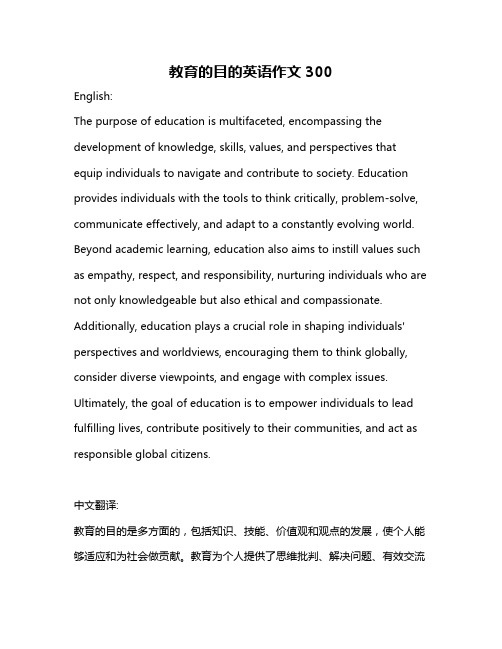
教育的目的英语作文300English:The purpose of education is multifaceted, encompassing the development of knowledge, skills, values, and perspectives that equip individuals to navigate and contribute to society. Education provides individuals with the tools to think critically, problem-solve, communicate effectively, and adapt to a constantly evolving world. Beyond academic learning, education also aims to instill values such as empathy, respect, and responsibility, nurturing individuals who are not only knowledgeable but also ethical and compassionate. Additionally, education plays a crucial role in shaping individuals' perspectives and worldviews, encouraging them to think globally, consider diverse viewpoints, and engage with complex issues. Ultimately, the goal of education is to empower individuals to lead fulfilling lives, contribute positively to their communities, and act as responsible global citizens.中文翻译:教育的目的是多方面的,包括知识、技能、价值观和观点的发展,使个人能够适应和为社会做贡献。
《教育哲学石中英》课件
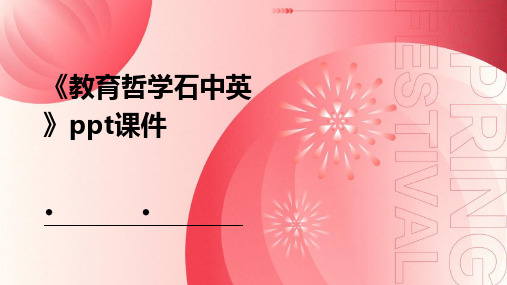
学校与社区的关系
石中英教育哲学提倡学校 与社区的互动与合作,共 同促进社区的发展和学生 的成长。
06
总结与展望
石中英教育哲学的贡献与局限
在此添加您的文本17字
贡献
在此添加您的文本16字局限在此添加您的文本1字教育哲学与实践的互动关系
教育哲学应该紧密联系教育实践,为 解决教育问题提供理论支持和实践指 导。
教育哲学与实践的互动关系是相互促 进、共同发展的关系,只有将理论和 实践相结合,才能更好地推动教育的 发展和进步。
教育实践应该不断反思和总结经验, 为教育哲学的发展提供实践基础和依 据。
感谢观看
THANKS
02
教育目的与价值
教育目的的哲学思考
培养人的自由和全面发展
教育应关注人的自由和全面发展,通过提供多样化的学习 机会和资源,激发个体的潜能和创造力,促进人的自我实 现和成长。
培养社会责任感
教育应培养个体对社会的责任感和公民意识,通过参与社 会活动和公共事务,促进个体与社会的互动和共同发展。
培养批判性思维和创新精神
价值与情感价值相互补充、相互促进,体现了教育价值的多元性。
03
工具价值与人文价值的统一
教育既培养个体的实用技能和能力,也关注个体的道德和精神成长。工
具价值与人文价值相互渗透、相互影响,体现了教育价值的多元性。
教育目的与个人发展
教育目的引导个人发展
教育目的是个人发展的指南和目标,通过教育目的的引导,个体能够明确自己的发展方向 和目标,实现自我价值和成长。
教育应培养个体的批判性思维和创新精神,鼓励独立思考 和自主探究,激发个体的创新能力和实践精神。
21条蒙台梭利名言(中英文)
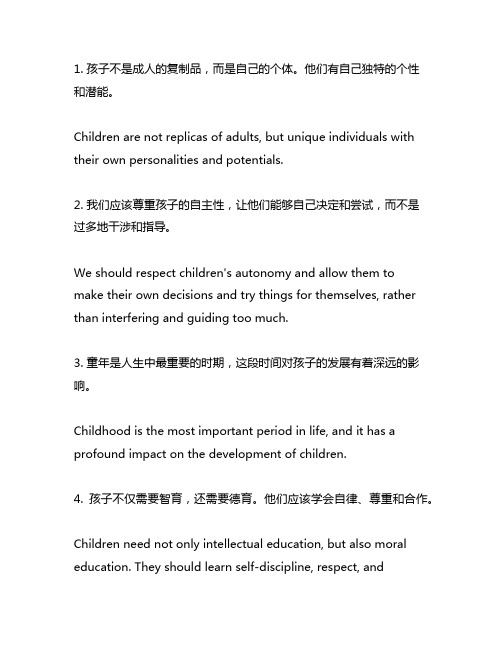
1. 孩子不是成人的复制品,而是自己的个体。
他们有自己独特的个性和潜能。
Children are not replicas of adults, but unique individuals with their own personalities and potentials.2. 我们应该尊重孩子的自主性,让他们能够自己决定和尝试,而不是过多地干涉和指导。
We should respect children's autonomy and allow them to make their own decisions and try things for themselves, rather than interfering and guiding too much.3. 童年是人生中最重要的时期,这段时间对孩子的发展有着深远的影响。
Childhood is the most important period in life, and it has a profound impact on the development of children.4. 孩子不仅需要智育,还需要德育。
他们应该学会自律、尊重和合作。
Children need not only intellectual education, but also moral education. They should learn self-discipline, respect, andcooperation.5. 教育不应该是被动的灌输,而应该是激发孩子的求知欲和自主学习能力。
Education should not be passive indoctrination, but should stimulate children's curiosity and independent learning ability.6. 教师应该成为孩子成长道路上的引导者和伙伴,而不是权威和控制者。
教育的目的的英文作文
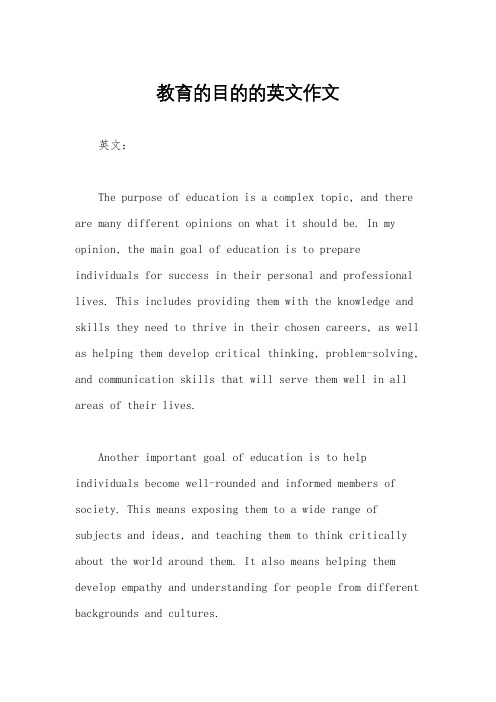
教育的目的的英文作文英文:The purpose of education is a complex topic, and there are many different opinions on what it should be. In my opinion, the main goal of education is to prepare individuals for success in their personal and professional lives. This includes providing them with the knowledge and skills they need to thrive in their chosen careers, as well as helping them develop critical thinking, problem-solving, and communication skills that will serve them well in all areas of their lives.Another important goal of education is to help individuals become well-rounded and informed members of society. This means exposing them to a wide range of subjects and ideas, and teaching them to think critically about the world around them. It also means helping them develop empathy and understanding for people from different backgrounds and cultures.Ultimately, the purpose of education is to empower individuals to achieve their full potential and contributeto the world in meaningful ways. This can take manydifferent forms, from pursuing a career in a field they are passionate about to volunteering in their community to advocating for social justice causes.中文:教育的目的是一个复杂的话题,对于应该是什么有许多不同的看法。
伊索寓言中英文
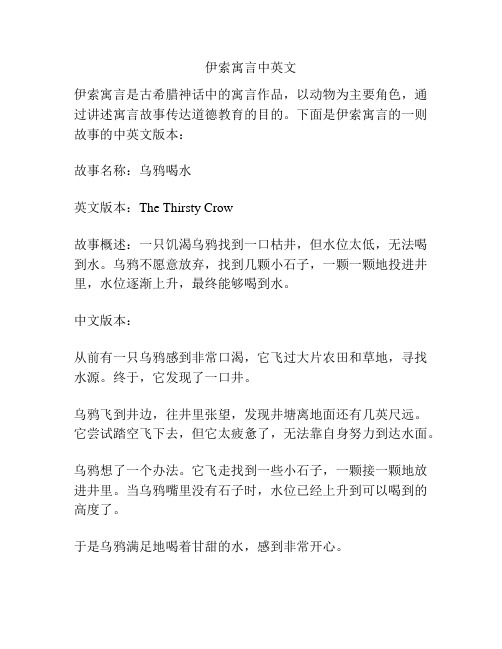
伊索寓言中英文
伊索寓言是古希腊神话中的寓言作品,以动物为主要角色,通过讲述寓言故事传达道德教育的目的。
下面是伊索寓言的一则故事的中英文版本:
故事名称:乌鸦喝水
英文版本:The Thirsty Crow
故事概述:一只饥渴乌鸦找到一口枯井,但水位太低,无法喝到水。
乌鸦不愿意放弃,找到几颗小石子,一颗一颗地投进井里,水位逐渐上升,最终能够喝到水。
中文版本:
从前有一只乌鸦感到非常口渴,它飞过大片农田和草地,寻找水源。
终于,它发现了一口井。
乌鸦飞到井边,往井里张望,发现井塘离地面还有几英尺远。
它尝试踏空飞下去,但它太疲惫了,无法靠自身努力到达水面。
乌鸦想了一个办法。
它飞走找到一些小石子,一颗接一颗地放进井里。
当乌鸦嘴里没有石子时,水位已经上升到可以喝到的高度了。
于是乌鸦满足地喝着甘甜的水,感到非常开心。
寓意:寓言告诉我们即便面对困难,只要勇于尝试和有创新的思维,就会找到解决问题的办法。
- 1、下载文档前请自行甄别文档内容的完整性,平台不提供额外的编辑、内容补充、找答案等附加服务。
- 2、"仅部分预览"的文档,不可在线预览部分如存在完整性等问题,可反馈申请退款(可完整预览的文档不适用该条件!)。
- 3、如文档侵犯您的权益,请联系客服反馈,我们会尽快为您处理(人工客服工作时间:9:00-18:30)。
三自由与纪律的节奏理想的逐渐消失可悲的证明了人类的努力遭受了挫折。
在古代的学园中,哲学家们渴望传授智慧,而在今天的大学里,我们卑微的目的却是教授各种科目。
从古人向往追求神圣的智慧,降低到现人获得各个科目的书本知识,这标志着在漫长的时间里教育的失败。
我并不坚持认为,在教育实践中古人比我们更成功。
你只须去读一读卢奇安的作品,注意他笔下对各派哲学家的自命不凡的主张所进行的戏剧化的讽刺,你就会明白,古代的圣人们并不能夸耀在教育方面比我们高明。
我只是想说明,当欧洲文明的曙光初露时,人类最初是怀着种种完美的理想,这些理想本该促进教育;但渐渐地,我们的理想为了与实践保持一致而变得淡漠了。
当理想降低到实践的水平时,其结果便是停滞不前。
特别是当我们把智力教育看作仅仅是获得机械呆板的大脑能力,看作仅仅在于对有用的原理作系统的叙述,那么就不可能有任何进步,尽管在对课程大纲无目的的重新安排中,在回避那不可避免的时间短缺的徒劳的努力中,将会进行许多活动。
我们必须接受这样一个无法回避的事实:上帝创造了这样一个世界,其中众多的知识主题决非一个人所能The Aims of EducationThe Rhythmic Claims of Freedom and DisciplineThe only avenue towards wisdom is by freedom in the presence of knowledge. But the only avenue towards knowledge is by discipline in the acquirement of ordered fact.Freedom and discipline are the two essentials of education, and hence the title of my discourse to-day, "The Rhythmic Claims of Freedom and Discipline."The antithesis in education between freedom and discipline is not so sharp as a logical analysis of the meaning of the terms might lead us to imagine. The pupil's mind is a growing organism. On the one hand, it is not a box to be ruthlessly packed with alien ideas:and, on the other hand, the ordered acquirement of knowledge is the natural food for a developing intelligence. Accordingly, it should be the aim of an ideally constructed education that the discipline should be the voluntary issue of free choice, and that the freedom should gain an enrichment of possibility as the issue of discipline. The two principles,freedom and discipline, are not antagonists, but should be so adjusted in the child's life that they correspond to a natural sway, to and fro, of the developing personality. It is this adaptation of freedom and discipline to the natural sway of development that I have elsewhere called The Rhythm of Education. I am convinced that much disappointing failure in the past has been due to neglect of attention to the importance of this rhythm. My main position is that the dominant note of education at its beginning and at its end is freedom, but that there is an intermediate stage of discipline with freedom in subordination: Furthermore, that there is not one unique threefold cycle of freedom, discipline, and freedom; but that all mental development is composed of such cycles, and of cycles of such cycles. Such a cycle is a unit cell, or brick; and the complete stage of growth is an organic structure of such cells. In analysing any one such cell, I call the first period of freedom the "stage of Romance," the intermediate period of discipline I call the "stage of Precision," and the final period of freedom is the "stage of Generalisation."Let me now explain myself in more detail. There can be no mental development without interest. Interest is the sine qua non for attention and apprehension. You mayendeavour to excite interest by means of birch rods, or you may coax it by the incitement of pleasurable activity. But without interest there will be no progress. Now the natural mode by which living organisms are excited towards suitable self-development is enjoyment. The infant is lured to adapt itself to its environment by its love of its mother and its nurse; we eat because we like a good dinner: we subdue the forces of nature because we have been lured to discovery by an insatiable curiosity: we enjoy exercise:and we enjoy the unchristian passion of hating our dangerous enemies. Undoubtedly pain is one supervenes on the failure of pleasure. Joy is the normal healthy spur for the elan vital. I am not maintaining that we can safely abandon ourselves to the allurement of the greater immediate joys. What I do mean is that we should seek to arrange the development of character along a path of natural activity, in itself pleasurable. The subordinate stiffening of discipline must be directed to secure some long-time good; although an adequate object must not be too far below the horizon, if the necessary interest is to be retained.The second preliminary point which I wish to make, is the unimportance----indeed the evil----of barren knowledge lies in its use, in our active mastery of it----that is to day, it lies in wisdom.It is a convention to speak of mere knowledge, apart from wisdom, as of itself imparting a peculiar dignity to its possessor. I do not share in this reverence for knowledge as such.It all depends on who has the knowledge and what he does with it. That knowledge which adds greatness to character is knowledge so handled as to transform every phase of immediate experience. It is in respect to the activity of knowledge that an over-vigorous discipline in education is so harmful. The habit of active thought,with freshness, can only be generated by adequate freedom. Undiscriminating discipline defeats its own object by dulling the mind. If you have much to do with the young as they emerge from school and from the university, you soon note the dulled minds of those whose education has consisted in the acquirement of inert knowledge. Also the deplorable tone of English society in respect to learning is a tribute to our educational failure. Furthermore, this overhaste to impart mere knowledge defeats itself. The human mind rejects knowledge imparted in this way.The craving for expansion, for activity,inherent in youth is disgusted by a dry imposition of disciplined knowledge. The discipline, when it comes, should satisfy a natural craving for the wisdom which adds value to bare experience.But let us now examine more closely the rhythm of these natural cravings of the human intelligence. The first procedure of the mind in a new environment is a somewhat discursive activity amid a welter of ideas and experience. It is a process of discovery, a process of becoming used to curious thoughts, of shaping questions, of seeking for answers, of devising new experiences, of noticing what happens as the result of new ventures. This general process is both natural and of absorbing interest. We must often have noticed children between the ages of eight and thirteen absorbed in its ferment. It is dominated by wonder, and cursed be the dullard who destroys wonder. Now undoubtedly this stage of development requires help, and even discipline. The environment within which the mind is working must be carefully selected. It must, of course, be chosen to suit the child's stage of growth, and must beadapted to individual needs. In a sense it is an imposition from without; but in a deeper sense it answers to the call of life within the child. In the teacher's consciousness the child has been sent to his telescope to look at the stars, in the child's consciousness he has been given free access to the glory of the heavens. Unless, working somewhere, however obscurely, even in the dullest child, there is this transfiguration of imposed routine, the child's nature will refuse to assimilate the alien material. It must never be forgotten that education is not a process of packing articles in a trunk. Such a simile is entirely inapplicable. It is, of course, a process completely of its own peculiar genus. Its nearest analogue is the assimilation of food by a living organism: and we all know how necessary to health is palatable food under suitable conditions. When you have put your boots in a trunk, they will stay there till you take them out again; but this is not at all the case if you feed a child with the wrong food.教育的目的自由与纪律的节奏通往智慧的惟一的道路是在知识面前享有自由,但通往知识的惟一途径是在获取有条理的事实时保持纪律。
